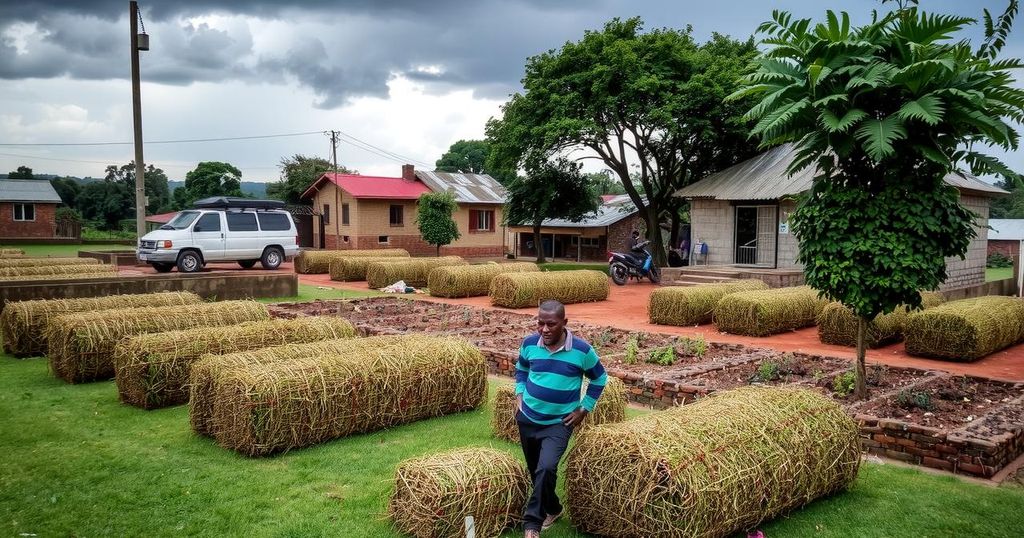Climate change
AFRICA, BEIRA, CHIKUSE, CLIMATE CHANGE, DEPARTMENT OF DISASTER MANAGEMENT AFFAIRS, DIALOGUE EARTH, DISASTER MANAGEMENT, DODMA, EARTH, FLOODING, FOOD SECURITY, MALAWI, MBENJE, MOZAMBIQUE, MT, NSANJE, PI, PILIRANI MTUPA, SAHARAN AFRICA, SUB - SAHARAN AFRICA, WORLD METEOROLOGICAL ORGANIZATION
Jamal Walker
0 Comments
Malawi’s Climate Crisis: A Barrier to Development Goals
Malawi is facing severe challenges due to climate change-related disasters, costing an estimated USD 1.19 billion in damages from 2015 to 2023. Recent cyclones and weather extremes have devastated agriculture and infrastructure, prompting calls for increased funding for climate adaptation. The nation’s MW2063 development agenda aims for significant economic improvement but is jeopardized by these ongoing disasters, necessitating urgent international support for resilience building.
Malawi is currently grappling with the severe impacts of climate change-induced disasters, which have persisted for six consecutive years. The country’s recovery from events such as Tropical Storm Ana, Cyclones Idai and Freddy, along with the influence of El Niño, has impeded economic progress, incurring an estimated cost of USD 1.19 billion, as indicated by the Department of Disaster Management Affairs (Dodma). Deputy director Fedson Chikuse emphasized an expected recovery expense of USD 1.7 billion to aid affected families and reconstruct the vital agriculture sector, a cornerstone of Malawi’s economy.
The World Meteorological Organization reveals that African nations are losing 2-5% of their GDP annually to climate-related hazards, compelling governments to reallocate up to 9% of their budgets for emergency responses. In Sub-Saharan Africa, adaptation costs may reach USD 30-50 billion each year over the next decade, equating to 2-3% of the region’s GDP.
A historical perspective reveals tragic losses in 2019 when Cyclone Idai struck, resulting in extensive destruction and loss of life. Philirina Mtupa, a resident from Nsanje district, detailed the adverse impacts on local farming due to recurrent disasters. The aftermath of Cyclone Ana in 2022 further compounded these challenges, leading to widespread flooding, infrastructural damage, and significant crop loss.
Cyclone Freddy, occurring in March 2023, became the longest – lasting cyclone on record and caused an estimated USD 506.7 million in damages. The devastation increased President Lazarus Chakwera’s urgency to declare a state of disaster during the subsequent El Niño event, which adversely affected nearly two million farming households and devastated national crop areas.
Despite these challenges, Malawi strives for ambitious socioeconomic goals through the MW2063 development agenda, aiming to elevate its status to upper-middle-income by 2063. However, numerous setbacks from natural disasters threaten to derail this vision, as noted by the Malawi National Planning Commission’s director general, Thomas Chataghalala Munthali. The call for increased climate finance is resonated by former president Joyce Banda, who asserts that support for adaptation efforts is critical at international forums.
The article highlights the ongoing climate crisis faced by Malawi, characterized by severe weather patterns causing significant disruptions to the country’s socio-economic development. Notable disasters such as Cyclone Idai, Cyclone Freddy, and El Niño have wreaked havoc over the past six years, affecting multiple sectors, particularly agriculture. The Government of Malawi’s ongoing initiatives, such as the MW2063 agenda, aimed at achieving sustainable economic growth, face significant challenges due to the financial burden of recovery from these disasters and the need for external assistance to build resilience against future climate change impacts.
In summary, Malawi’s battle against climate change and its resultant natural disasters poses a tremendous threat to its socio-economic aspirations. The financial losses incurred from such events underscore the pressing need for strategic adaptation and recovery measures. Without robust international financial support and the development of resilient agricultural systems, Malawi’s ambitious MW2063 agenda risks being severely compromised, hindering the nation’s path towards becoming a self-reliant, industrialized nation.
Original Source: dialogue.earth




Post Comment